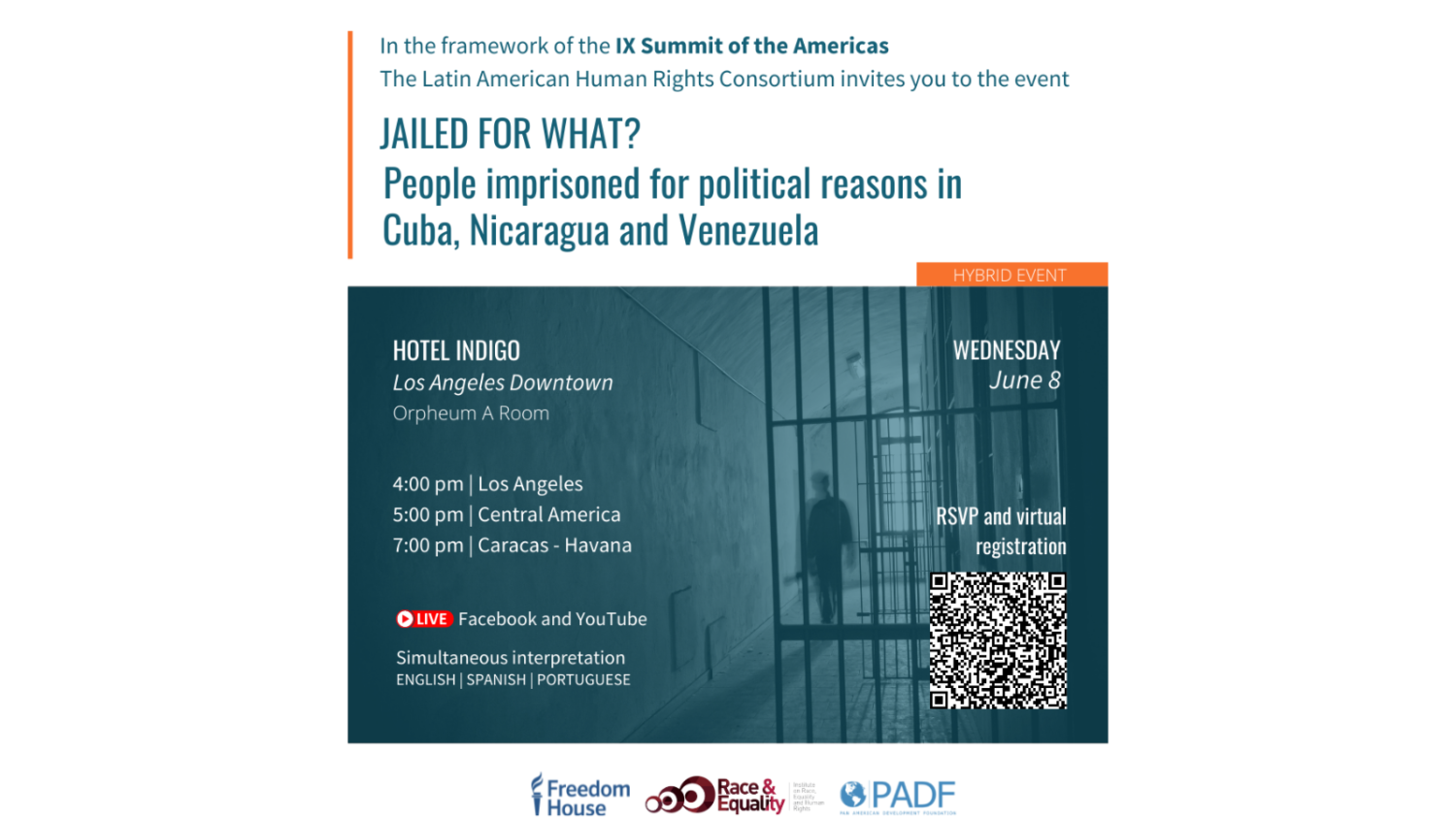Race and Equality denounces the situation of political prisoners in Cuba, Nicaragua, and Venezuela in the framework of the IX Summit of the Americas
Washington DC, June 2, 2022.- In the framework of the Summit of the Americas, the Latin American Human Rights Consortium – which is led by the Institute on Race, Equality […]

Washington DC, June 2, 2022.- In the framework of the Summit of the Americas, the Latin American Human Rights Consortium – which is led by the Institute on Race, Equality and Human Rights (Race and Equality) – will hold the event “Jailed for what?: People imprisoned for political reasons in Cuba, Nicaragua and Venezuela”, whose objective is to generate a space for reflection and dialogue on the circumstances and conditions experienced by persons deprived of liberty in the exercise of their fundamental rights in those three countries.
The event, which will be hybrid, will take place on Wednesday, June 8, in the Orpheum A room of the Hotel Indigo, in Los Angeles (California), starting at 4:00 pm local time (5:00 pm Central America time and 7:00 pm Caracas and Havana time). It will also be broadcast on the Race and Equality Facebook page and YouTube channel.
Panelists include Uzra Zeya, Under Secretary for Civilian Security, Democracy and Human Rights of the United States; Brian A. Nichols, Assistant Secretary of State for Western Hemisphere Affairs; the Rapporteur on the Rights of Persons Deprived of Liberty and for the Prevention and Combat of Torture, Edgar Stuardo Ralón; and the Executive Director of Race and Equality, Carlos Quesada.
There will also be the participation of Victoria Cárdenas, Nicaraguan businesswoman and wife of the presidential candidate and political prisoner of the Ortega and Murillo regime, Juan Sebastián Chamorro; Anamely Ramos, Cuban artist and human rights defender; Munira Muñoz, lawyer and coordinator of the organization Foro Penal USA/Venezuela. The event will be moderated by David Álvarez Veloso, Coordinator of the Human Rights Consortium.
The situation of political prisoners in Cuba, Nicaragua, and Venezuela
The number of political prisoners in Cuba, Nicaragua and Venezuela continues to increase. These three countries are characterized by authoritarian governments that use laws to criminalize activities that promote and defend human rights, journalism, and political opposition.
Cuba
In Cuba, whose single-party system maintains tight control over society in all its spheres, there were 150 political prisoners until July 2021, but after the historic protests of July 11 and 12, the figure increased to more than 1,400. Among those detained there are at least 50 minors, of whom, as of March 2022, 20 have been prosecuted and sentenced to between 7 and 13 years in prison.
Nicaragua
In Nicaragua, the state and para-state repression of the peaceful demonstrations that began in April 2018 resulted in 355 fatalities, more than 2,000 people injured, and 1,614 arbitrary detentions.
The crisis has lasted for more than four years and, currently, more than 170 people are imprisoned for political reasons, without access to specialized medical attention in conditions that do not comply with the United Nations Minimum Rules for the Treatment of Prisoners (Nelson Mandela Rules) and the Internal Law on Human Rights, that can be described as cruel, inhuman, degrading treatment, physical and psychological torture. This situation is especially critical for the 14 women political prisoners, 19 elderly people and people with chronic illnesses.
Venezuela
Since 2014, Venezuela has not been the exception to the deepening of the human rights crisis, after citizens came out to protest the economic situation and insecurity in the country. That year, the number of people detained for political reasons reached 3,708, while in 2017 there were 5,511 arrests for the same reasons. Currently, according to the Foro Penal organization, there are 239 people deprived of liberty for political reasons in this country.
Since 2014, at least 10 political prisoners have lost their lives and the Foro Penal organization has reported that prison conditions in the country are precarious and has registered cases of prisoners for political reasons who are held together with common prisoners.
When is a person a political prisoner?
In the field of international law, there is no definition or characterization of political prisoners. However, the existence of this problem in the region has made it possible to identify criteria to determine when a person has been deprived of liberty for political reasons, regardless of the country where they are registered.
These are some:
- The person’s activities are linked to the exercise of freedom of expression, association or assembly, the political opposition, the defense of human rights and peaceful demonstrations.
The State carries out actions in order to consolidate or retain power, which result in human rights violations.
- There is a use and articulation of State structures and institutions for the arbitrary deprivation of liberty of the person and their criminalization.
- The context is characterized by single-party and authoritarian states, where democratic institutions do not exist…although there are cases recorded in contexts of countries with certain recognized democratic institutions.
Event information: Jailed for what? People imprisoned for political reasons in Cuba, Nicaragua, and Venezuela.
Wednesday, June 8, 2022
4:00 PM Los Angeles | 5:00 PM Central America | 7:00 PM Caracas – Havana
Hotel Indigo – Los Angeles, Downtown | Orpheum Hall A
RSVP and virtual registration: https://bit.ly/3sVeJAw
Simultaneous interpretation SPANISH | ENGLISH | PORTUGUESE

